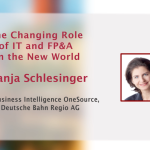In today’s volatile environment, standalone digital improvements are rarely enough. Increasingly, there is an accelerated need...
According to an international, multi-sector survey conducted in 2018, executives noted that improved operational efficiency (40%), faster time to market (36%) and meeting changing customer expectations (35%) were the top benefits of digital transformation. Yet, IDG noted that only 7% of companies have fully implemented digital transformation strategies.
As finance professionals, we have to be data-driven to partner up with businesses effectively and assist in optimising the performance of each department. Clearly, this cannot be achieved by using outdated systems and traditional processes. Unfortunately, the majority of professionals haven’t made the shift to full digital transformation yet. I am not talking about implementing the newest technological tool and expecting a major increase in value being delivered. Digital transformation relates to changes in business processes, corporate cultures and customer experiences using digital technologies.
A survey conducted by Deloitte found that an increase in digital transformation maturity strongly correlates to an increase in financial performance (45% increase in net revenue growth and 43% increase in net profit margin for high maturity respondents). At the same time, McKinsey found that up to 70% of large-scale change programs are unsuccessful mainly due to employee resistance.
So why are we as finance professionals, so slow to adopt digital transformation when there are so many proven benefits to us and the companies we operate in? I believe this is due to three main fears.
Fear of change
For most of us, the journey to become a finance professional has been a long and hard one. Academic learning in various topics and disciplines are usually the start of this journey or has accompanied growth somewhere along the line. Practical experience in a range of roles and industries also makes up the core of any seasoned finance professional. It is understandable then that one would prefer tried and tested tools and processes you have become accustomed to along this journey. So many of us have become such super-efficient users of Microsoft Excel that we don’t really look around to see if there are any other tools that could assist us more and help us use more efficient processes.
Of course, cost always plays a major role in adopting new tools and investing time in redesigning traditional processes. But very rarely do we ever estimate the cost of not improving. Very rarely do we take into account the cost of performing tasks manually that could have been performed nearly instantly (and in our absence) by an automated system. Not even to mention the opportunity cost of the value we are losing doing manual and repetitive tasks, rather than spending time with the business units that so desperately need the expert advice that you are capable of delivering as a finance professional.
Fear of risk
We can all agree that change is accompanied by risk. I would propose though that not changing actually creates even bigger risks. The numbers are clear that companies that embrace digital transformation are outperforming their peers in a number of areas. The risks that come with change can definitely be mitigated with a comprehensive change management plan and should not be the roadblock that stops you from experiencing the multitude of benefits.
System integrations, Machine Learning and processing and automated reporting, are all products of digital transformation. This does create anxiety in some people as they are losing control, and they fear that something could go wrong without a human picking this up. As long as these types of projects are implemented properly, the opposite is actually true. Digital tools and processes have a much higher accuracy rate and human error is completely taken of the equation. It is vital that you do trust these tools and processes, and it is definitely worth spending a bit more time testing and training on these new systems to reduce this fear of losing control.
Some schools of thought also believe that information is less secure when it is all digital and automated. Data privacy is a legitimate concern in this new era where we are collecting more and more data. Staying up to date with the newest tools and process actually reduces this risk and ensures that your data remains as secure as it can be. Legacy and manual systems are much more prone to being hacked and can usually be leaked much easier.
Fear of being obsolete
As digital tools become more capable of doing more and more traditional finance tasks, many individuals may fear that these tools would replace them. This is where I believe the biggest mindset shift needs to happen. I am a very strong supporter that digital transformation isn’t here to replace our jobs but rather to assist us in delivering value in ways that have never been thought possible. This definitely means that our roles will change, but this is a change for the better and should never be seen in a negative light.
Sure, new tools and processes come with learning and adjustments, but there are many ways to ensure that this learning curve is not beyond your capabilities. Continuous learning definitely keeps the learning curve more gradual. Integrate upskilling and digital adoption into your career plan to ensure you consistently stay up to date with the best options out there. By making major changes at infrequent intervals, you are making the required adjustments much more difficult than they have to be.
Summary
More and more digital tools are becoming available to reduce the mundane and tedious tasks required of us. This gives us the freedom and capacity to focus on what we would really like to do and what business is expecting of us: partnering up and guiding them to optimal performance. This is not something that should be resisted. Rather, empower yourself and your team by investigating what solutions are out there to help you achieve your goal. Invest in solutions based on the value that you will obtain rather than the cost you need to incur.
Subscribe to
FP&A Trends Digest

We will regularly update you on the latest trends and developments in FP&A. Take the opportunity to have articles written by finance thought leaders delivered directly to your inbox; watch compelling webinars; connect with like-minded professionals; and become a part of our global community.






